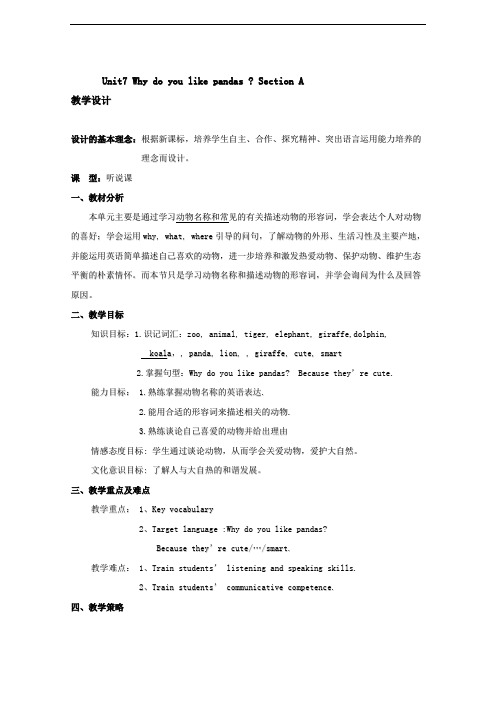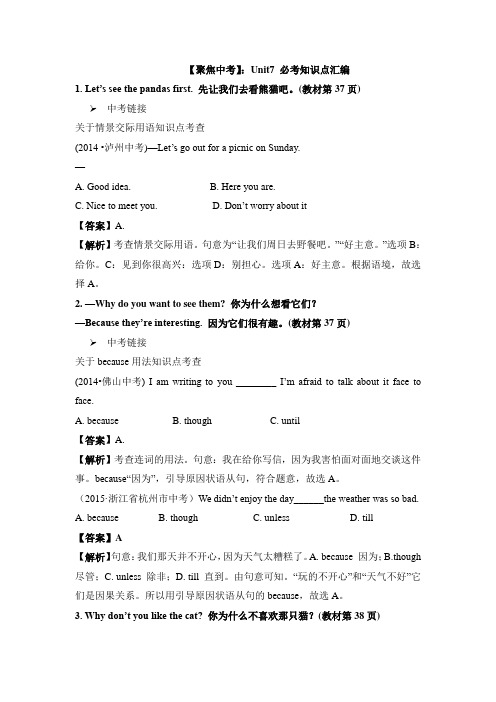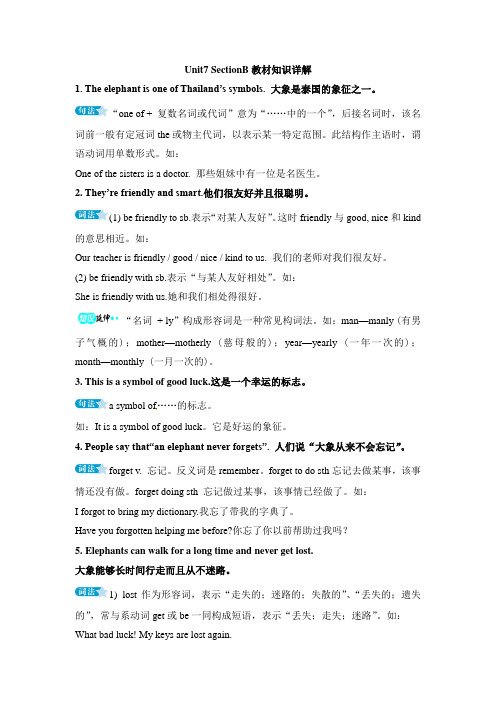鲁教版六年级下册英语Unit7知识点梳理
鲁教版五四制英语六年级下册Unit7 单元总复习课件

Unit 7 单元总复习课件
内容大纲
1
词汇训练营
2
句型大闯关
3
语法加油站
词汇训练营
词汇训练营
快速回忆所学单词,看谁说得又快又准!
一、快速说出下列单词或短语。 1. 熊猫 n. __p_a_n_d_a__ 2. 动物 n. ___a_n_i_m_a_l_ 3. 大象 n. _e_l_e_p_h_a_n_t 4. 可爱的 adj. _c_u_t_e_____ 5. 聪明的 adj. __sm__a_r_t___ 6. 友好的 adj. __fr_i_e_n_d_ly__ be friendly to sb. 对某人友好 7. 砍倒 __c_u_t_d_o_w_n___ 8. 处于(极大)危险中 __b_e_i_n_(_g_r_e_a_t_) _d_a_n_g_e_r
句型大闯关
本单元重点句子有哪些?看谁说得多!
8. People cut down many trees so elephants are losing their homes. 人们砍到了许多树,因此,大象正在渐渐失去它们的 家园。
(1) cut down 砍到,其后的宾语如果是名词,可以放在cut 和down中间,也可以放在down后面;如果是代词,必须放 在二者之间。
词汇训练营
单词填空,考查综合运用能力!
二、根据首字母或汉语提示填空。
1. There are many a_n_im__a_l_s_ in the zoo, we can go and see them this weekend. 2. Tina is kind of s_h_y___ and she doesn’t want to meet others or speak to others. 3. Hong Kong is in the s_o_u_t_h____ of China. 4. Her __fr_i_e_n_d_s_ (friend) are very __fr_i_e_n_d_l_y_ (friend) to us. We all thank them. 5. My brother goes to bed early and s_le_e_p_s____ very well every night. 6. Dolphins(海豚) are very s_m__a_r_t__. They can learn something from people.
鲁教版英语六年级下Unit7 Why do you like pandas SectionA (8)

U n i t7W h y d o y o u l i k e p a n d a s?S e c t i o n A教学设计设计的基本理念:根据新课标,培养学生自主、合作、探究精神、突出语言运用能力培养的理念而设计。
课型:听说课一、教材分析本单元主要是通过学习动物名称和常见的有关描述动物的形容词,学会表达个人对动物的喜好;学会运用w h y,w h a t,w h e r e引导的问句,了解动物的外形、生活习性及主要产地,并能运用英语简单描述自己喜欢的动物,进一步培养和激发热爱动物、保护动物、维护生态平衡的朴素情怀。
而本节只是学习动物名称和描述动物的形容词,并学会询问为什么及回答原因。
二、教学目标知识目标:1.识记词汇:z o o,a n i m a l,t i g e r,e l e p h a n t,g i r a f f e,d o l p h i n,k o a l a,,p a n d a,l i o n,,g i r a f f e,c u t e,s m a r t2.掌握句型:W h y d o y o u l i k e p a n d a s?B e c a u s e t h e y’r e c u t e.能力目标:1.熟练掌握动物名称的英语表达.2.能用合适的形容词来描述相关的动物.3.熟练谈论自己喜爱的动物并给出理由情感态度目标:学生通过谈论动物,从而学会关爱动物,爱护大自然。
文化意识目标:了解人与大自热的和谐发展。
三、教学重点及难点教学重点:1、K e y v o c a b u l a r y2、T a r g e t l a n g u a g e:W h y d o y o u l i k e p a n d a s?B e c a u s e t h e y’r e c u t e/…/s m a r t.教学难点:1、T r a i n s t u d e n t s’l i s t e n i n g a n d s p e a k i n g s k i l l s.2、T r a i n s t u d e n t s’c o m m u n i c a t i v e c o m p e t e n c e.四、教学策略本单元主要是学会运用w h y,w h a t,w h e r e引导的问句,了解动物的外形、生活习性及主要产地,并能运用英语简单描述自己喜欢的动物,激发学生主动参与的欲望。
Unit7鲁教版英语六下

Talk about animals that you like or dislike and the reason for that.
I like ______ because they’re ______. I don’t like ____ because they’re ______.
学习目标 学会用形容词描述动物。
Abilities · can play soccer or music · can also draw very well · can remember places with food and water How to save them ·don’t cut down so many trees ·don’t buy things made of ivory · March 13th is Thai Elephant Day
学习目标 1、学会运用 Where is … from? It’s from … 2、理解2d的课文。 3、理解并能熟练运用文中的语言点。
1. He can walk on two legs. 2. That’s a good name for her.
①翻译这两个句子。
1. 他会用两条腿走路。
学习目标 1、理解2b的课文。 2、掌握并熟练运用文中的语言点。
Read the article and answer the questions.
1. Where the students from?
They’re from Thailand.
2. When is Thai Elephant Day?
Look! This is Beibei. He is five years old. She is from Sichuan, China. I like Beibei because he is cute and shy. She lives in Beijing Zoo. Don’t you like him?
鲁教版五四制英语六年级下册【聚焦中考】:Unit7 必考知识点汇编

【聚焦中考】:Unit7 必考知识点汇编1. Let’s see the pandas first. 先让我们去看熊猫吧。
(教材第37页)中考链接关于情景交际用语知识点考查(2014 •泸州中考)—Let’s go out for a picnic on Sunday.—________A. Good idea.B. Here you are.C. Nice to meet you.D. Don’t worry about it【答案】A.【解析】考查情景交际用语。
句意为“让我们周日去野餐吧。
”“好主意。
”选项B:给你。
C:见到你很高兴:选项D:别担心。
选项A:好主意。
根据语境,故选择A。
2. —Why do you want to see them? 你为什么想看它们?—Because they’re interesting. 因为它们很有趣。
(教材第37页)中考链接关于because用法知识点考查(2014•佛山中考) I am writing to you ________ I’m afraid to talk about i t face to face.A. becauseB. thoughC. until【答案】A.【解析】考查连词的用法。
句意:我在给你写信,因为我害怕面对面地交谈这件事。
because“因为”,引导原因状语从句,符合题意,故选A。
(2015·浙江省杭州市中考)We didn’t enjoy the day______the weather was so bad.A. becauseB. thoughC. unlessD. till【答案】A【解析】句意:我们那天并不开心,因为天气太糟糕了。
A. because 因为;B.though 尽管;C. unless 除非;D. till 直到。
由句意可知。
“玩的不开心”和“天气不好”它们是因果关系。
所以用引导原因状语从句的because,故选A。
鲁教版六年级下册英语Unit7知识点梳理

鲁教版六年级下册英语Unit7知识点梳理oneof+名词复数(做主语时谓语用单数形式)(......其中之一)ourfirstflag我们的第一面旗asymbolofgoodluckasymbolof好运的象征…的象征drawwell(v一般+adv,be、系动词一般+adj)画得好forgettodo(未做)forgetdoing(做过)忘记做某事get/belost迷路placeswithfoodandwater有食物和水的地方beingreatdanger处于极度危险cutdown砍倒killelephantsfortheirivory为了象牙杀害大象over=morethan超过/多于bemadeof...由…制成ThaiElephantDay大象节二、句型展示 1.—Let'sseethepandasfirst.They'remyfavoriteanimals.咱们先看熊猫吧,我最喜欢熊猫了。
—Why?为什么?—Becausethe y’reverycute.因为它们非常可爱。
2.Whydoyouwanttoseethem?你为什么想看它们?3.Hecanwalkontwolegs.他(指“狗”)会立着行.4.—Whydon’tyoulikethecat?你为什么不喜欢这猫?—Well,becauseshe'skindofboring,shesleepsallday.因为她有点儿令人乏味,并且整天都在睡觉5.—Whydon'tyouliketigers?你为何不喜欢老虎?—Becausethey'rereallyscary.因为它们确实可怕。
6.—Wherearelionsfrom?狮子来自什么地方?—They'refromSouthAfrica.他们来自南非。
7.ButIliketigersalot.但我非常喜欢老虎。
8.Ourfirstflaghadawhiteelephantonit.我们的第一面国旗上就绘着一头白象!9.Peoplesaythat“anelephantneverforgets.”人们说大象从来不会忘记。
鲁教版五四制英语六年级下册Unit7 SectionB教材知识详解

Unit7 SectionB教材知识详解1. The elephant is one of Thailand’s symbols. 大象是泰国的象征之一。
“one of + 复数名词或代词”意为“……中的一个”,后接名词时,该名词前一般有定冠词the或物主代词,以表示某一特定范围。
此结构作主语时,谓语动词用单数形式。
如:One of the sisters is a doctor. 那些姐妹中有一位是名医生。
2. They’re friendly and smart.他们很友好并且很聪明。
(1) be friendly to sb.表示“对某人友好”。
这时friendly与good, nice和kind 的意思相近。
如:Our teacher is friendly / good / nice / kind to us. 我们的老师对我们很友好。
(2) be friendly with sb.表示“与某人友好相处”。
如:She is friendly with us.她和我们相处得很好。
“名词+ ly”构成形容词是一种常见构词法。
如:man—manly (有男子气概的);mother—motherly (慈母般的);year—yearly (一年一次的);month—monthly (一月一次的)。
3. This is a symbol of good luck.这是一个幸运的标志。
a symbol of……的标志。
如:It is a symbol of good luck。
它是好运的象征。
4. People say that“an elephant never forgets”.人们说“大象从来不会忘记”。
forget v. 忘记。
反义词是remember。
forget to do sth忘记去做某事,该事情还没有做。
forget doing sth 忘记做过某事,该事情已经做了。
如:I forgot to bring my dictionary.我忘了带我的字典了。
鲁教版英语(五四制)六年级下册_Unit7_单元知识汇总
Unit7 单元知识汇总【短语归纳】1. kind of 有几分,有点儿2. be from / come from 来自于3. South Africa 南非4. all day 整天5. for a long time 很长时间6. get lost 迷路7. places with food and water 有食物和水的地方8. cut down 砍倒9. in (great) danger 处于(极大)危险之中10. twelve years old 十二岁11. things made of ivory 由象牙制成的东西【用法集萃】1. —Why…? 为什么……?—Because… 因为……2. let sb. do sth. 让某人做某事3.want to do sth. 想要做某事4. one of + 名词复数……之一5. forget to do sth. 忘记要做某事6. forget doing sth. 忘记做过某事7. help sb. (to) do sth. 帮助某人做某事8. be friendly to sb. 对某人友好【典句必背】1. —Why do you like pandas? 你为什么喜欢熊猫?—Because they’re kind of interesting. 因为它们有点儿有趣。
2. —Why does John like koalas? 约翰为什么喜欢树袋熊?—Because they’re very cute. 因为它们非常可爱。
3. —Why don’t you like tigers? 你为什么不喜欢老虎?—Because they’re really scary. 因为它们真的吓人。
4. —Where are lions from? 狮子来自哪里?—They’re from South Africa. 它们来自南非。
5. Elephants can walk for a long time and never get lost.大象能走很长时间并且从不迷路。
六年级英语下册鲁教版 Unit 7 Why do you like pandas.Section A
六年级英语下册鲁教版 Unit 7 Why do you like pandas.Section A (1a1c)语法素材Unit 7 Why do you like pandas? Section A(1a-2c)特殊疑问句的讲解及练习特殊疑问句的自述展示平台Hello, everyone! 在介绍自己之前请先看几个句子:What is your name? How are you? Where is the cat? When do you get up in the morning? 怎么样,认识它们吗?这些句子也就是我——特殊疑问句。
有人说英语的疑问句与汉语有所不同,学起来比较吃力。
其实,我在英语的句子可是非常重要的,想了解我多一点,那就来吧!帮你分析1 疑问词我的定义是以what, who, when, where, how 等开头的疑问句。
这些表示疑问的词叫做疑问词。
当然提问的内容的不同,我们使用的疑问词也不同。
问物或做什么事用what,问电话号码也用what; 问人的用who; 问谁的用whose; 问哪里用where; 问何时用when; 问年龄用how old; 问身高用how tall; 问颜色用what colour等。
例如:①—What colour is your sweater? —It’s blue.—你的毛衣是什么颜色的?—蓝色。
②—Where is your father? —He’s in the kitchen.—你的爸爸在哪?—他在厨房。
2 语序想知道对方是谁,汉语中可问“你是谁?”译成英语时语序变了,成了“Who are you ?”而不能是“You are who?”所以,在英语中,我们特殊疑问句一般用倒装的语序,即用“特殊疑问词+一般疑问句的语序”构成。
小贴士如果疑问词在句中作主语,则其后直接跟动词,语序不变。
例如:Who is going to the park tomorrow? 明天谁要去公园?3 回答回答一般疑问句用yes和no来回答。
最新鲁教新版六年级英语下第七单元知识点
鲁教新版六年级英语下第七单元知识点Unit 7 Why do you like pandas? 语法1. 动物的名称2. 描述动物的形容词短语1.整天all day2.有点kind of = a little3.用2条腿走路walk on two legs4.来自be from= come from5.什么动物what animals6.……之一one of +可数名(复数形式)7.好运的象征a symbol of good luck8.长时间的9.迷路get lost10.处于极大的危险之中 be in greatdanger11.砍伐树木cut down trees12.由..制成be made of13.想做want to do 14.使让某人做某事let sb(宾格) do sth句子15.你为什么喜欢熊猫? Why do youlike panda s?16.因为他们非常可爱。
Because theyare very cute.17.你为什么不喜欢老虎? Why don’t youlike tiger s?18.因为他们有点恐怖。
Because theyare kind of scary. = Because they are alittle scary.19.让我们先看长颈鹿吧。
Let’s see thegiraffe s first.20.狮子来自哪里? Where are lion sfrom?21.他们来自南非。
They are fromSouth Africa.22.我非常喜欢大象。
I like elephant s alot. = I like elephant s very much.短文P38 2d句型变换1.They are from Australia. = They comefrom Australia. (对划线部分提问)仅供学习交流come from? (注意对应关系)2.She likes elephants because they aresymbols of good luck. (对划线部分提问)Why does she like elephant s?3.John likes giraffes. (对划线部分提问)What animals does John like?4. Tony wants to go to the zoo. (改为否定句)Tony doesn’t want to go to the zoo.仅供学习交流。
Unit7SectionA2d-3c课件 鲁教版(五四制)六年级英语下册
3. What pet does Jenny’s mom have? S_h_e__h_a_s_a__c_a_t._____________________
Read the sentences.
Questions
Answers
Why do you like pandas?
Because they’re kind of interesting.
Why does John like Koalas? Because they’re very cute.
Why don’t you like tigers? Because they’re really scary.
I like…, because I think…I don’t like…because…
*** likes …, because he/she thinks … He/She doesn’t like… because …
3c Think of an animal. Ask and answer questions with your partner to guess each other’s animal. A: Is the animal big? B: Yes, it is. A: Where’s the animal from? B: It’s from China. A: Is it black and white? B: Yes, it is. A: It’s a panda! B: Yes, you’re right!
- 1、下载文档前请自行甄别文档内容的完整性,平台不提供额外的编辑、内容补充、找答案等附加服务。
- 2、"仅部分预览"的文档,不可在线预览部分如存在完整性等问题,可反馈申请退款(可完整预览的文档不适用该条件!)。
- 3、如文档侵犯您的权益,请联系客服反馈,我们会尽快为您处理(人工客服工作时间:9:00-18:30)。
鲁教版六年级下册英语Unit7知识点梳理
鲁教版六年级下册英语Unit7 Why do you like pandas? 原型记忆记忆情况默写检查importance in Thailand 在泰国的重要性Let’s see…. first. let's do 让我们先看... 让我们做某事favorite animals 最喜欢的动物kind of interesting 有点有趣South Africa 南非be from =come from 来自be smart 聪明的walk on two legs Walk on 用两条腿走用…行走all day/all night 整天/整夜 a good name for her 对于她是个好名字like …a lot 非常喜欢...... black and white 黑白相间You’re right. 你是正确的。
one of +名词复数(做主语时谓语用单数形式)(......其中之一)our first flag 我们的第一面旗a symbol of good luck a symbol of 好运的象征…的象征draw well (v一般+adv,be、系动词一般+adj)画得好forget to do(未做)forget doing(做过)忘记做某事get/be lost 迷路places with food and water 有食物和水的地方be in great danger 处于极度危险cut down 砍倒kill elephants for their ivory 为了象牙杀害大象over = more than 超过/多于be made of... 由…制成Thai Elephant Day 大象节二、句型展示 1. —Let's see the pandas first. They're my favorite animals.咱们先看熊猫吧,我最喜欢熊猫了。
—Why?为什么?—Because they’re very cute.因为它们非常可爱。
2. Why do you want to see them? 你为什么想看它们?
3. He can walk on two legs.他(指“狗”)会立着行.
4. —Why don’t you like the cat? 你为什么不喜欢这猫? —Well,because she's kind of boring, she sleeps all day.因为她有点儿令人乏味,并且整天都在睡觉
5. —Why don't you like tigers? 你为何不喜欢老虎?—Because they're really scary. 因为它们确实可怕。
6. —Where are lions from? 狮子来自什么地方?—They're from South Africa.他们来自南非。
7. But I like tigers a lot.但我非常喜欢老虎。
8. Our first flag had a white elephant on it.我们的第一面国旗上就绘着一头白象!9. People say that “an elephant never forgets. ”人们说大象从来不会忘记。
10. Elephants can walk for a long time and never get lost.大象能够长时间行走,而且不迷路。
11. But elephants are in great danger.但是大象面临巨大的危险。
12. We must save the trees and not buy things made of ivory.我们必须拯救树木,拒买象牙制品。
三、重难点讲解重点句型解析1. Let’s see the pandas first. (1)祈使句,句式为“Let’s do sth.”意为“让我们……吧。
”主要用来提出建议和请求, 劝对方一起做,包括听话者在内。
否定式是“Let’s not do sth.”,意为“让我们不做某事”。
例如:Let’s play football together. 我们一起踢足球吧。
Let’s not tell anyone. 我们谁也别告诉。
(2)“Let us do sth.” 意为“让/允许我们做某事”,表示提出请求,请对方允许,不包括听话者在内。
例如:
Let us go with you, my dear father. 亲爱的爸爸,让我们和你一起去吧。
2. Why do you like pandas? (1)why引导的特殊疑问句,用来询问原因句式是“Why + be动词/ 情态动词/ 助动词+ 主语+ 动词?”。
意为“为什么做……”。
常用because引导的句子来回答。
because是连词,表示直接的理由。
例如:-Why is she here? 她为什么在这儿? -Because she has things to do. 因为他有事要做。
-Why do you study math?你为什么学数学? -Because it’s important. 因为它很重要。
(2) why还可以表示建议常用于句型“Why not + do sth.?或Why don’t you + do sth.?”意为“为什么不……?”。
例如:Why not go out for a walk? Why don’t you go shopping? 为什么不去购物呢? (3) why可以做感叹词,表示吃惊、不耐烦或轻微的抗议、反对及犹豫等不同的语气。
例如:Why, don’t you know him? 啊,难道你不认识他吗? 4. Isn’t she beautiful? (1)本句是一个否定疑问句。
否定疑问句通常以be动词、情态动词或助动词与not的缩写形式开头,意思是“难道……不……吗?”,可以表示说话者惊异的情绪、责难的口吻或赞叹;也可以表示说话者的某种建议、邀请或者看法等。
例: Aren’t you an American? 难道你不是个美国人吗? Can’t she play football? 她难道不会踢足球吗? (2)否定疑问句的回答与一般疑问句的回答一样,凡是与事实相符的用Yes,不相符的用No。
但在翻译时,要将Yes 翻译作“不”,将No翻译作“是的”;这一点和汉语不同。
例如:
-Doesn’t he want to go? 她难道不想去吗? - -Yes, he does. 不,她想去。
-No, he doesn’t. 是的,她不想去。
5. Where are they from? (1)此句是where引导的特殊疑问句,即“Where + be + 主语+ from”句型回答时,介词from后跟表示国家、城市等的地点名词。
对Where 引导的特殊疑问句应根据实际情况作出回答。
(2)介词from意为来自,be from = come from 意为“从……来,来自”。
“be from”构成的句式,否定句疑问句等句式的变换或者时态的变化由be来实现。
“come from”构成的句式,各种句式或者时态的变化要用come或者助动词等来实现。
例如:I am from Beijing.. = I come from Beijing.. 我来自上海。
Are you from Beijing.? = Do you come from Beijing.? 你来自上海吗? Sh e isn’t from Beijing.. =She doesn’t come from Beijing. 她不是来自上海。
